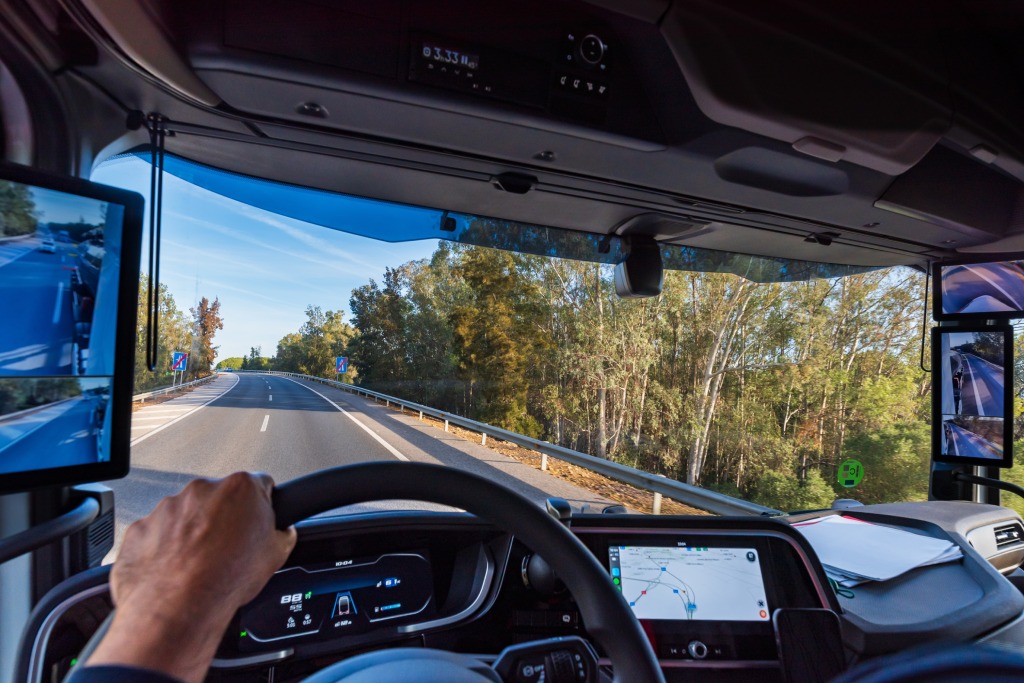Maximize Efficiency with Advanced Fleet Management
No fleet. No deliveries. Inefficient fleet. Inefficient deliveries. Your business’s health depends directly on your fleet’s health, which is why you need a system that works.
Advanced fleet management takes the handling of your trucks and drivers past basic scheduling and zeroes in on how to make deliveries faster, with fewer errors, and lower costs. Here is a look at four areas where better fleet management can equal more profitability.
Utilizing Technology for Real-Time Monitoring

Integrating advanced technologies revolutionizes fleet management, making real-time tracking and data-driven decision-making not just a goal but a reality. Here are some of the newest and most exciting technologies that help you keep eyes on your cargo across every single mile of the road:
GPS Tracking and Telematics
Modern fleet management systems allow for real-time monitoring through GPS tracking and telematics. Managers can instantly know the location, speed, and route of every truck in the fleet, and then use that information to optimize routes and slash money-sucking idle time. According to ABI Research, 40% of fleet managers cite route optimization as one of the essential benefits of telematics systems, which directly impacts fuel efficiency and delivery times.
AI and Machine Learning for Predictive Maintenance
Advanced fleet management platforms leverage AI and machine learning to predict potential vehicle issues before they lead to costly breakdowns. By analyzing vehicle performance data, AI systems can schedule maintenance precisely when needed, reducing unexpected downtime by up to 30%. This proactive approach helps avoid disruptions in the supply chain, boosting overall operational efficiency.
Cloud-Based Fleet Management Solutions
Cloud-based platforms offer centralized data access from any location, allowing fleet managers to monitor vehicles and make real-time decisions. This level of connectivity helps streamline operations and keep every part of the fleet working in harmony. Systems provide easy-to-access reports on fuel usage, vehicle status, and driver performance, allowing you to see and correct inefficiencies at a glance.
Optimizing Driver Performance
Even the best-managed fleet will underperform without optimized driver behavior. Addressing driver performance through training and monitoring can significantly improve overall efficiency.
Driver Behavior Monitoring
Telematics systems help track vehicle locations and provide insights into driving behavior, including speed, harsh braking, and acceleration patterns. Studies show that monitoring driver behavior can reduce fuel consumption by 5-10%. Telematics systems provide alerts when drivers engage in risky behavior, allowing fleet managers to intervene with real-time feedback.
Incentivizing Safe Driving Practices
One effective strategy is implementing a driver incentive program that rewards safe and fuel-efficient driving. An incentive program can be accomplished by leveraging the data collected through telematics to establish benchmarks for fuel consumption, speed adherence, and driving hours. These programs can reduce insurance premiums and minimize the risk of accidents, ultimately lowering operating costs.
Ongoing Training Programs
Regular training programs to update drivers on the latest safety and efficiency practices can improve efficiency. Topics should include defensive driving, eco-friendly driving techniques, and compliance with regulatory changes. Continuous training helps drivers make better road decisions, reducing wear and tear on vehicles and improving fuel efficiency.
Reduce Operational Costs

Cutting operational costs is an ongoing challenge in fleet management, and successful managers use a combination of strategies to stay competitive while maintaining high service levels.
Fuel Management Strategies
Fuel is one of the most significant expenses for any fleet, making fuel efficiency critical. Telematics systems and GPS route optimization tools can help save fuel by showing drivers how to avoid traffic congestion and choosing the shortest, most fuel-efficient routes. Additionally, drivers can be trained on fuel-efficient driving techniques, such as maintaining steady speeds and avoiding unnecessary idling, which wastes fuel.
Vehicle Utilization and Lifecycle Management
Maximizing vehicle utilization means ensuring each vehicle is used to its full potential before incurring additional costs. A well-managed fleet will track metrics like vehicle miles driven, maintenance history, and load capacity. These data points help determine when a vehicle is due for replacement or can be utilized more effectively. Proper vehicle utilization can extend a truck’s lifecycle by up to 15%, translating into significant cost savings.
Optimized Inventory Management
Effective inventory management is essential for minimizing vehicle repairs and parts replacement costs. Implementing a just-in-time inventory system ensures that spare parts are available exactly when needed, reducing warehouse storage costs and downtime due to unavailable parts.
Enhancing Safety Measures

Safety is a top priority in fleet management, and adopting a safety-first approach directly impacts operational efficiency and cost savings.
Vehicle Inspections and Compliance
Regular vehicle inspections are required by law and are essential for preventing accidents and breakdowns. Telematics systems can assist by automating inspection schedules and confirming that each vehicle is in top condition before hitting the road. Non-compliance with safety regulations can result in hefty fines, vehicle downtime, and a tarnished company reputation.
Fatigue Management for Drivers
Driver fatigue is a frequent cause of accidents in the trucking industry. Modern fleet management solutions can monitor driver hours and rest periods, making sure that all drivers comply with hours-of-service (HOS) regulations. By reducing overworked drivers, these systems reduce the number of fatigue-related trucking accidents.
Accident Prevention and Insurance Cost Reduction
Investing in advanced driver assistance systems (ADAS) such as lane departure warnings, collision avoidance systems, and automated braking can help you slash your fleet’s number of accidents. Not only will your drivers be safer, but fewer accidents could also lower your insurance premiums and save you thousands on vehicle repair costs. Fleets that adopt these technologies can reduce accident rates by up to 30 percent.
Improve with Fleet Management
Maximizing efficiency in truck fleet management requires a comprehensive approach that includes adopting the latest technology, optimizing driver performance, reducing operational costs, and implementing new safety measures. By investing in these advanced techniques, fleet managers can improve operational efficiency and achieve long-term sustainability and profitability.
Maximize your trucking operation’s efficiency and stay competitive by adopting advanced fleet management strategies with MexCal Truckline, a trusted name in the San Diego-Tijuana corridor.
Our reliable all-in-one transportation and logistics solution is a 40+ year story of success in helping businesses like yours deliver goods on time, every time, with the highest level of security and efficiency. Let’s talk about your needs today!






